Japan expressed concern on Monday over Iran's advancing uranium enrichment program and the Middle East country's suspected supplying of combat drones to Moscow for Russia's war on Ukraine.
Japan's Foreign Minister Yoshimasa Hayashi raised the two issues during talks with his visiting Iranian counterpart, Hossein Amirabdollahian, the foreign ministry in Tokyo said. A statement from the ministry said Hayashi appealed for Iran to act constructively in the matter but did not elaborate.
Iranian drones have been a key element of Russia's continued war on Ukraine. Tehran has offered conflicting accounts about the drones — first denying Iran has supplied them to Russia and later claiming the unmanned aircraft were only sold before the Russian invasion.
However, the number of Iranian-made drones used in the conflict shows a steady supply of the bomb-carrying weapons. In June, the White House said Iran was providing Russia with materials to build a drone manufacturing plant east of Moscow as the Kremlin looks to lock in a consistent stream of weapons.
As U.S. ally and a member of the Group of Seven advanced nations, Japan has joined sanctions against Moscow while providing Ukraine with humanitarian support and non-lethal defense equipment, largely because of fear that Russia's invasion could embolden an already assertive China in Asia.
Iran's state television said Amirabdollahian denied providing drones to Russia and insisted Tehran is focused on efforts for dialogue and finding a political solution to end the war. The report also quoted the top Iranian diplomat as saying the United States and the West should stop what he described as baseless accusations against Iran.
Hayashi also expressed serious concern about the expansion of Iran's nuclear activities and urged Tehran's full and unconditional cooperation with the International Atomic Energy Agency, the ministry added.
The ministry statement said Hayashi stressed Japan's support for the Joint Comprehensive Plan of Action, the 2015 nuclear deal between Iran and world powers that curbed Iran's enrichment in return for halting economic sanctions on Iran. In 2018, then-President Donald Trump pulled America out of the nuclear deal and restored crushing sanctions.
Since then, Iran's government has been galloping ahead with its nuclear program, openly exceeding the deal's limits on uranium enrichment and stockpiling, and building a new nuclear facility so far underground as to likely be impervious to U.S. weapons.
Experts say Iran can now develop atomic bombs if it chooses to do so. A U.S. intelligence assessment released in July said Iran is not pursuing nuclear weapons at the moment but has ramped up activities that could help it develop them.
In talks with Hayashi, Amirabdollahian said Iran is seeking ways to reactivate the nuclear agreement through negotiations and expressed appreciation for Japanese diplomatic efforts, the ministry also said.





